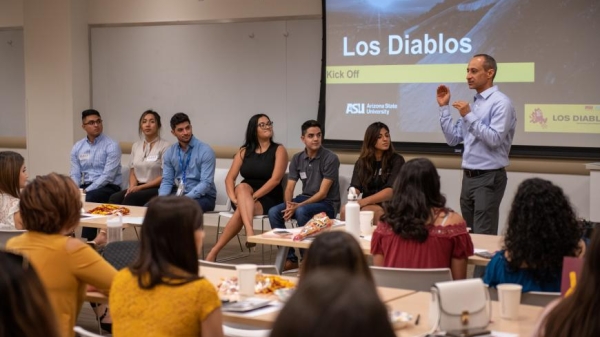ASU spells success for new military advocate

Kelley Stewart, an ASU alum, is the newest military advocate at the Pat Tillman Veterans Center. Photo by Jerry Gonzalez/ASU
She was once a student greatly invested in Arizona State University life and now, years later, she is back to help military veterans get the most of their college experience.
Kelley Stewart, class of 2008 and holder of a bachelor’s degree in applied psychology, is the newest military advocate at the Pat Tillman Veterans Center.
As a student, Stewart earned many accolades while serving in the Associated Students of ASU Presidents Council and as a member of various committees that were instrumental in shaping the campus into what it is today.
“Kelley comes with a terrific background in student engagement, having been an exemplary ‘engaged’ student here at ASU,” said Steve Borden, director of ASU’s Pat Tillman Veterans Center. “Her background in student government will assist our staff in helping students engage in ASU culture and also help them better understand how being engaged in the university will have a direct outcome in their success now and beyond.”
Stewart is the only student in ASU history to be elected student body president four times — twice as an undergrad and twice as a grad student. She also served as a student worker entrepreneurial ambassador and a management intern with ASU’s Career Services.
“I was very busy,” said Stewart, ASU’s 2008 Martin Luther King Jr. Student Servant-Leadership Award recipient. “Getting involved as a student and becoming a student leader embedded me in the ASU experience.”
Stewart began her pursuit of higher education at Mesa Community College (MCC) before transferring to ASU in 2004. At MCC she learned something very important — finding opportunities. Through the years she has connected to “many positive experiences” as a result.
“One of the skills I learned there that I brought to ASU is to look for open doors,” she said. “I think our students that just hit campus and leave or sort of stay closed off are missing 75 percent of what ASU can do for them.”
Regardless of a student’s pursuit of opportunities on campus, education is the key, said Stewart, who is one class away from completing her master’s degree. Education betters people by opening their minds and motivating them to be civically engaged.
“The diversity that you learn in a university this size and how to negotiate and get along with individuals from all different walks of life is huge,” said Stewart. “We learn at ASU how to observe our world, voice our concern, but then also jump in.”
The daughter of a U.S. Navy veteran, Stewart looks forward to contributing to ASU’s reputation as one of the top veteran schools in the nation — a reputation that has led to the gradual increase in military-affiliated students and their family members, which now stands at nearly 5,600.
Stewart has firsthand experience understanding veteran needs. As an instructor at MCC’s Fire Science Emergency Medical Technician Program, she has seen an influx of veterans go through the program and has been pivotal in assisting some achieve their educational goals in her additional role as an academic tutor.
“When you take a nine-credit-hour course and squeeze it into one semester, it’s difficult for students who may not have been in college recently,” said Stewart. “They need extra academic support.”
ASU’s military advocates can point students to the right place to access academic or other support. They are a unique part of ASU and aren’t usually found in other universities, said Borden.
“Our advocates work specifically in student veteran engagement — helping navigate the university, assisting them in getting involved, ensuring our veterans know what is available to them and how to take advantage of it,” he said. “They are part mentors, part life coach, part success coach and an always available sounding board to help discuss difficulties and how to navigate through them.”
Navigating the university and through sources of information is often not as simple as it may seem. That’s where the military advocate steps in, said Stewart. Their role is to lead the way for those needing assistance.
“Students who are unfamiliar with college or who’ve only been (attending school) online don’t necessarily know the questions they need to ask,” said Stewart. “So for me it’s more about a passion for connecting students with the resources they’re eligible for but are not aware of.”
Stewart also has a son serving in the Navy. She hopes to recruit him to join the Sun Devil family either now while he is in active duty or after his service concludes. Stewart highlights the fact that ASU supports the educational goals of military members around the globe.
Although Stewart’s office is on the Polytechnic campus, she will travel to any campus to assist student veterans. If there’s a need, she’ll be there to help others succeed in the name of her alma mater — something she’s very proud of.
“I’m a dyed-in-the-wool Sun Devil, and I’m happy to be home,” she said.
More University news

ASU Alumni Association to honor 3 outstanding alumni leaders during Homecoming
The Arizona State University Alumni Association will proudly recognize three innovative alumni leaders during the Homecoming…

From service to civilian success
Transitioning from military to civilian life is a unique experience that can be challenging for veterans. Some struggle to find…

ASU as the 'New American University' sets the model for higher education reform
Arizona State University’s charter is only 46 words long, but it’s a bold promise that’s a model for the reinvention of higher…